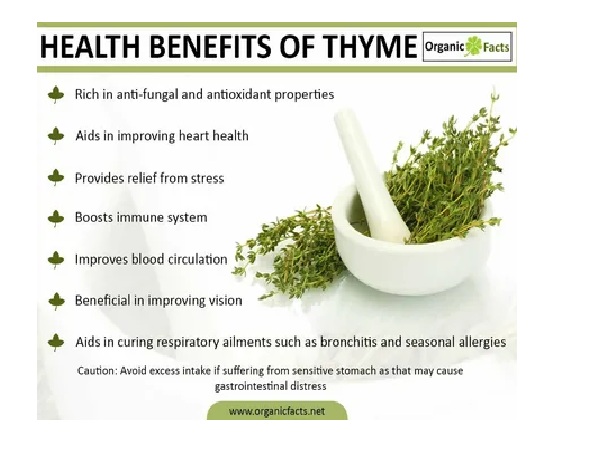
Benefits of Thyme Supplements
It belongs to the mint family, Lamiaceae, and has a long history of culinary and medicinal use dating back to ancient times. Thyme is prized for its aromatic leaves, which contain an array of bioactive compounds that contribute to its medicinal properties. In this comprehensive guide, we will explore the various benefits of thyme supplements, including their historical uses, active constituents, and current scientific evidence supporting their efficacy.
Understanding Thyme
Thyme has been revered for its culinary and medicinal properties for centuries. It is characterized by its small, pungent leaves and clusters of delicate purple or white flowers. Thyme is rich in essential oils, including thymol, carvacrol, and linalool, as well as flavonoids, tannins, and other bioactive compounds. These constituents give thyme its characteristic aroma and flavor and contribute to its therapeutic effects.
Antimicrobial Properties:
One of the primary benefits of thyme supplements is their potent antimicrobial properties. Thyme contains compounds such as thymol and carvacrol, which have been shown to exhibit broad-spectrum antimicrobial activity against bacteria, fungi, and viruses. Thyme supplements may help inhibit the growth of pathogenic microorganisms, including antibiotic-resistant strains, and support the body’s immune defenses against infections. Thyme supplements are often used to alleviate symptoms of respiratory infections, such as coughs, colds, and sore throats, and may help shorten the duration of illness.
Respiratory Health Support
Thyme supplements are commonly used to support respiratory health and alleviate symptoms of respiratory conditions. Thyme contains volatile oils that have expectorant and bronchodilator properties, making it useful for relieving coughs, congestion, and respiratory inflammation. Thyme supplements may help loosen and expel mucus from the airways, reduce coughing spasms, and soothe irritated throat tissues. Thyme supplements are often used in herbal cough syrups, lozenges, and teas to provide relief from respiratory symptoms.
Digestive Aid
Thyme supplements may help support digestive health and alleviate symptoms of digestive disorders. Thyme contains compounds that stimulate digestive enzymes and improve gastrointestinal motility, making it useful for relieving indigestion, bloating, and gas. Thyme supplements may help reduce symptoms of irritable bowel syndrome (IBS), such as abdominal pain and cramping, and promote overall digestive comfort. Thyme supplements are often used as a culinary herb to enhance the flavor of savory dishes and aid digestion.
Antioxidant Effects
Thyme supplements exhibit potent antioxidant activity due to their high content of phenolic compounds, flavonoids, and other antioxidants. These compounds help neutralize free radicals and oxidative stress, which contribute to aging, inflammation, and chronic diseases. Thyme supplements may help protect cells and tissues from damage caused by oxidative stress and support overall health and well-being. Thyme supplements may also have anti-inflammatory effects, helping to reduce inflammation and prevent oxidative damage in the body.
Immune System Support
Thyme supplements may help support the immune system and enhance the body’s defenses against infections and disease. Thyme contains compounds that stimulate immune cell activity and enhance the production of cytokines and antibodies, which play a crucial role in immune function. Thyme supplements may help reduce the severity and duration of infections, such as colds and flu, and support overall immune health. Thyme supplements are often used as a natural remedy to boost immunity during periods of increased susceptibility to illness.
Cardiovascular Health Promotion
Emerging research suggests that thyme supplements may have beneficial effects on cardiovascular health. Thyme contains compounds that help regulate blood pressure, reduce cholesterol levels, and improve blood vessel function, which are important factors for heart health. Thyme supplements may help reduce the risk of hypertension, atherosclerosis, and heart disease by promoting vascular health and reducing inflammation and oxidative stress. Thyme supplements may also help improve circulation and reduce the risk of blood clots and stroke.
Dosage and Safety Considerations
Thyme supplements are generally considered safe for most individuals when used as directed. However, it is essential to follow the dosage instructions provided by the manufacturer or healthcare professional. Thyme supplements are available in various forms, including capsules, tinctures, teas, and essential oils. The dosage may vary depending on factors such as age, weight, and the intended use of the supplement. It’s essential not to exceed the recommended dosage or use thyme supplements for extended periods without consulting a healthcare professional. Pregnant and breastfeeding women should use caution and consult with their healthcare provider before using thyme supplements.
Conclusion
In conclusion, thyme supplements offer a wide range of potential health benefits, including antimicrobial properties, respiratory health support, digestive aid, antioxidant effects, immune system support, cardiovascular health promotion, and more. While scientific research on thyme’s efficacy is ongoing, its long history of traditional use and promising preliminary evidence suggest that it may serve as a valuable natural remedy for various health concerns. By incorporating thyme supplements into your wellness routine, you can explore natural approaches to support your health and well-being. However, it is essential to use thyme supplements with caution and under the guidance of a qualified healthcare professional to ensure safety and efficacy.
- Benefits of Bladderwrack Supplements - April 2, 2024
- Benefits of Black Walnut Supplements - April 2, 2024
- Benefits of Black Haw Supplements - April 2, 2024